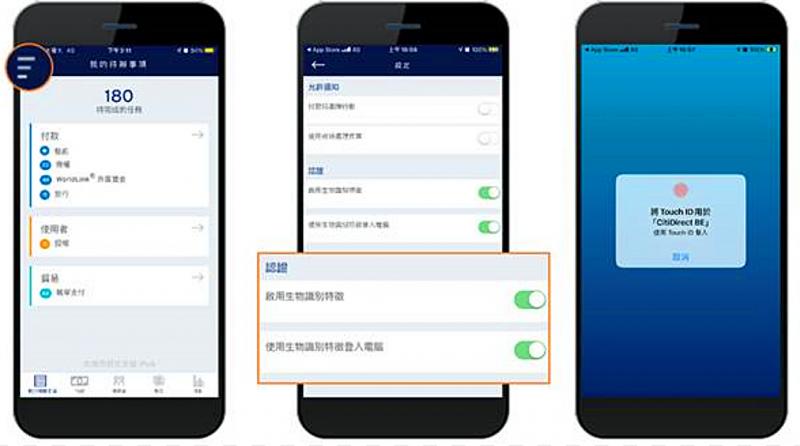Due to the COVID-19 outbreak, the proportion of customers using corporate mobile online banking has increased significantly, and the number of customers logging in to online banking using biometric methods has also increased markedly, Citibank Taiwan Ltd (花旗台灣) said.
The bank launched its mobile version of online banking — the CitiDirect BE app — for corporate customers earlier this year. It allows users to log on to online banking services using biometrics. Customers can also use this technology to log on to the desktop version of online banking for faster, simpler and more real-time financial services, the bank said.
The app provides customers with a fast, simple and secure banking experience, it said. Using the app, customers can authorize payments, check balances and cash positions, and manage users, it added.

Photo courtesy of Citibank Taiwan Ltd
To provide customers with more user-friendly and flexible access to online banking services, the app is compatible with the authentication mechanism of the existing dynamic password card, and it also allows customers to access existing CitiDirect BE online banking services through the use of biometric functions, such as fingerprint recognition or facial recognition, it added.
“Since the local COVID-19 outbreak intensified in mid-May and after the government issued a level 3 alert nationwide, many corporate customers have begun to implement work-at-home programs or divide people into different groups to work, while their transaction patterns and fund management has also changed,” said William Mor (毛偉麟), head of Treasury and Trade Solutions at Citibank Taiwan.
“We see the demand for digital financial solutions from corporate customers, and the proportion of those using CitiDirect BE mobile online banking is rapidly increasing,” he said. “Whether it is using a smartphone, tablet or a PC, the number of people logging on to CitiDirect BE using biometrics showed a significant increase in May compared with April, and we expect a more dramatic increase in June.”
“Citi’s Treasury and Trade Solutions provides the best digital financial solutions for corporate customers. Citibank redesigned the entire transaction process to provide an end-to-end digital banking experience for corporate customers to transform,” Mor said. “Through the digital solutions provided by Citibank, we have continuously and effectively assisted our customers and their business operations during the pandemic. Citibank will continue its commitment to becoming the digital platform of choice for digital business, and continue expanding the digital banking infrastructure to assist customers’ current and future needs.”
Citi’s Treasury and Trade Solutions provides innovative integrated services, tailor-made cash management and trade financing services to multinational companies, financial institutions and government departments around the world. It has the industry’s largest operating network, with banking licenses in more than 90 nations and a globally integrated technology platform.
FinanceAsia magazine last month named Citibank Taiwan this year’s “Best International Bank,” the 25th consecutive year that the bank has won the award. In addition, Global Finance magazine in September last year presented the bank with the “Best Corporate Digital Bank in Taiwan” award for the third consecutive year.

SELL-OFF: Investors expect tariff-driven volatility as the local boarse reopens today, while analysts say government support and solid fundamentals would steady sentiment Local investors are bracing for a sharp market downturn today as the nation’s financial markets resume trading following a two-day closure for national holidays before the weekend, with sentiment rattled by US President Donald Trump’s sweeping tariff announcement. Trump’s unveiling of new “reciprocal tariffs” on Wednesday triggered a sell-off in global markets, with the FTSE Taiwan Index Futures — a benchmark for Taiwanese equities traded in Singapore — tumbling 9.2 percent over the past two sessions. Meanwhile, the American depositary receipts (ADRs) of Taiwan Semiconductor Manufacturing Co (TSMC, 台積電), the most heavily weighted stock on the TAIEX, plunged 13.8 percent in

A wave of stop-loss selling and panic selling hit Taiwan's stock market at its opening today, with the weighted index plunging 2,086 points — a drop of more than 9.7 percent — marking the largest intraday point and percentage loss on record. The index bottomed out at 19,212.02, while futures were locked limit-down, with more than 1,000 stocks hitting their daily drop limit. Three heavyweight stocks — Taiwan Semiconductor Manufacturing Co (TSMC, 台積電), Hon Hai Precision Industry Co (Foxconn, 鴻海精密) and MediaTek (聯發科) — hit their limit-down prices as soon as the market opened, falling to NT$848 (US$25.54), NT$138.5 and NT$1,295 respectively. TSMC's

TARIFFS: The global ‘panic atmosphere remains strong,’ and foreign investors have continued to sell their holdings since the start of the year, the Ministry of Finance said The government yesterday authorized the activation of its NT$500 billion (US$15.15 billion) National Stabilization Fund (NSF) to prop up the local stock market after two days of sharp falls in reaction to US President Donald Trump’s new import tariffs. The Ministry of Finance said in a statement after the market close that the steering committee of the fund had been given the go-ahead to intervene in the market to bolster Taiwanese shares in a time of crisis. The fund has been authorized to use its assets “to carry out market stabilization tasks as appropriate to maintain the stability of Taiwan’s

In a small town in Paraguay, a showdown is brewing between traditional producers of yerba mate, a bitter herbal tea popular across South America, and miners of a shinier treasure: gold. A rush for the precious metal is pitting mate growers and indigenous groups against the expanding operations of small-scale miners who, until recently, were their neighbors, not nemeses. “They [the miners] have destroyed everything... The canals, springs, swamps,” said Vidal Britez, president of the Yerba Mate Producers’ Association of the town of Paso Yobai, about 210km east of capital Asuncion. “You can see the pollution from the dead fish.